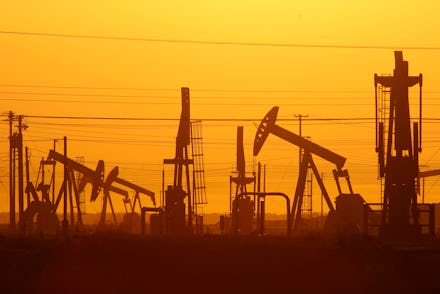Obama Just Unveiled the Most Ambitious Climate Change Plan Ever by a US President

On Monday, President Barack Obama unveiled a new plan that could ultimately surpass even the Affordable Care Act as his most significant domestic achievement.
In a new set of regulations called the "Clean Power Plan," the White House announced the first-ever restrictions on carbon emissions by power plants. The new rules, which are more strict than those proposed by the Environmental Protection Agency in recent years, mark the most aggressive action taken by a president in American history to face the challenge of global warming.
Obama laid out the plan in a speech in the East Room at the White House on Monday afternoon, saying it was "the single most important step America has ever taken in the fight against global climate change."
The plan, which includes a number of incentives for states to invest in renewable energy, calls for a 32% reduction in power plant carbon dioxide emissions from 2005 levels by 2030.
The ambitious new EPA proposal should not be taken as a sign of a growing climate policy consensus in Washington. Green activists think of it as a strong step in the right direction, but believe the administration has a number of holes in its climate policy that contradict the sentiment of the plan. The new regulations are also expected to face a legal onslaught from states and corporations who consider them too harsh on the fossil fuel industry.
At this point, the only certainty is that big thinking on climate change is having its day in the sun.
The plan: The Clean Power Plan does something unprecedented. While the United States already regulates the release of traditional pollutants like soot into the environment, the energy sector has not yet faced any limits on carbon emissions. Fossil fuel-fired power plants, which are the largest source of carbon emissions in the nation, could until now release as much carbon as they wanted to. That's no longer the case.
The new rules impose strict standards on the eventual winding down of carbon emissions, but it also offers states flexibility on how they choose to go about pursuing that goal. States are expected to submit preliminary agendas by 2016 and final versions of them by 2018, according to the New York Times. States will be expected to begin compliance with the federal regulations by 2022, and then phase in additional measures to hit the 2030 reduction target.
The new regulations will dramatically reshape the country's energy sector and could establish policies that would ultimately halt the construction of coal-fired power plants and shut many of them down.
While previously proposed versions of the rules suggested that natural gas — which leaves a much smaller carbon footprint than coal — could serve as a stepping stone away from coal-fired plants, Monday's plan emphasizes renewable energy. It establishes incentives for states to invest in renewables like wind and solar energy and aims to have renewable energy to account for 28% of electric generating capacity by 2030.
In his speech, the president defended the strict rules as a necessary measure for dealing with an issue already afflicting the country's health and weather, saying "there is such a thing is being too late when it comes to climate change."
The reception: Obama's new plan prompted a mixed response from some climate change activists, some of whom saw the step as bold but inadequate.
"This is the most significant step the Obama administration has taken to combat climate change. The regulations will be another nail in King Coal's coffin. But it's still not enough to secure the president's climate legacy," Jamie Henn, the communications director for the progressive climate change group 350.org said to Mic in an email. "It's easy to regulate an industry in decline. The real test will be taking on Big Oil and making tougher decisions, like turning down the Keystone XL pipeline, ending fracking and preventing offshore drilling."
NextGen Climate, the climate lobbying outfit that serves as the political arm of the green movement, struck an optimistic tone and called it a "smart" proposal: "The final Clean Power Plan represents a major turning point. It limits dangerous carbon pollution and creates a framework where our national policy and economic security can be freed from the short-term swings of volatile fossil fuel markets," Tom Steyer, the co-founder of NextGen, said in a statement.
But at this point the fate of the new regulations is more likely to be influenced by friends of the coal industry than it is by its enemies. The New York Times reports that the road ahead is daunting:
Senator Mitch McConnell of Kentucky, the Republican majority leader, has started an unusual pre-emptive campaign against the rules, asking governors to refuse to comply. Attorneys general from more than a dozen states are preparing legal challenges against the plan. Experts estimate that as many as 25 states will join in a suit against the rules and that the disputes will end up before the Supreme Court.
Like Obamacare, its future may ultimately determined in the courts. For now, though, the administration is showing that it's not backing down from ambitious new initiatives as Obama's time in office winds down.